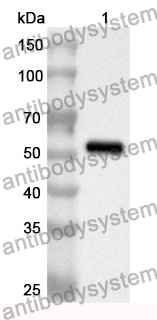Catalog No.
PHE95601
Species reactivity
Human, Mouse, Rat
Host species
Rabbit
Isotype
IgG
Clonality
Polyclonal
Immunogen
E. coli - derived recombinant Human STC1 (Ser28-Ala247).
Tested applications
ELISA: 1:4000-1:8000, IHC: 1:50-1:100, WB: 1:1000-1:4000
Target
STC1,Stanniocalcin-1,STC,STC-1
Purification
Purified by antigen affinity column.
Accession
P52823
Applications
ELISA, IHC, WB
Form
Liquid
Storage buffer
0.01M PBS, pH 7.4, 50% Glycerol, 0.05% Proclin 300.
Stability and Storage
Use a manual defrost freezer and avoid repeated freeze thaw cycles. Store at 2 to 8°C for frequent use. Store at -20 to -80°C for twelve months from the date of receipt.
Hypoxia Microenvironment Preconditioning Attenuated Myocardial Ischemia-Reperfusion Injury via Stc1-Mediating Cardiomyocyte Self-Protection and Neutrophil Polarization., PMID:39676707
FVIIa-PAR2 signaling facilitates immune escape by reducing phagocytic potential of macrophages in breast cancer., PMID:39667690
Imaging flow cytometry reveals LPS-induced changes to intracellular intensity and distribution of α-synuclein in a TLR4-dependent manner in STC-1 cells., PMID:39486562
A Newly Developed Anti-L1CAM Monoclonal Antibody Targets Small Cell Lung Carcinoma Cells., PMID:39201435
CircUBA2 promotes the cancer stem cell-like properties of gastric cancer through upregulating STC1 via sponging miR-144-5p., PMID:39103836
Biosensors Based on Stanniocalcin-1 Protein Antibodies Thin Films for Prostate Cancer Diagnosis., PMID:37998156
Analysis of the benefit of salvage chemotherapy after progression on nivolumab in patients with squamous cell carcinoma of the head and neck., PMID:37562096
Emerging phagocytosis checkpoints in cancer immunotherapy., PMID:36882399
Serum Autoantibodies against LRDD, STC1, and FOXA1 as Biomarkers in the Detection of Ovarian Cancer., PMID:35273656
Stanniocalcin 1 is a serum biomarker and potential therapeutic target for HBV-associated liver fibrosis., PMID:35122667
Stanniocalcin-1 protein expression profile and mechanisms in proliferation and cell death pathways in prostate cancer., PMID:31816356
Stanniocalcin 1 in tumor microenvironment promotes metastasis of ovarian cancer., PMID:31114228
Endothelial Stanniocalcin 1 Maintains Mitochondrial Bioenergetics and Prevents Oxidant-Induced Lung Injury via Toll-Like Receptor 4., PMID:30187766
The EndoC-βH1 cell line is a valid model of human beta cells and applicable for screenings to identify novel drug target candidates., PMID:29307512
Secretory Stanniocalcin 1 promotes metastasis of hepatocellular carcinoma through activation of JNK signaling pathway., PMID:28688970
Nicotine-Induced Effects on Nicotinic Acetylcholine Receptors (nAChRs), Ca2+ and Brain-Derived Neurotrophic Factor (BDNF) in STC-1 Cells., PMID:27846263
STC-1 expression is upregulated through an Akt/NF-κB-dependent pathway in triple-negative breast cancer cells., PMID:27461417
A novel anti-inflammatory role of GPR120 in intestinal epithelial cells., PMID:26791484
The oncogenetic role of stanniocalcin 1 in lung adenocarcinoma: a promising serum candidate biomarker for tracking lung adenocarcinoma progression., PMID:26577859
Severe Nephrotoxic Nephritis following Conditional and Kidney-Specific Knockdown of Stanniocalcin-1., PMID:26393521
GLP-1 amidation efficiency along the length of the intestine in mice, rats and pigs and in GLP-1 secreting cell lines., PMID:24486427
Stanniocalcin1 is a key mediator of amyloidogenic light chain induced cardiotoxicity., PMID:23982491
Expression of stanniocalcin-1 in culprit coronary plaques of patients with acute myocardial infarction or stable angina., PMID:23757035
Effects of somatostatin and octreotide on the interactions between neoplastic gastroenteropancreatic endocrine cells and endothelial cells: a comparison between in vitro and in vivo properties., PMID:21677423
Stanniocalcin-1 promotes tumor angiogenesis through up-regulation of VEGF in gastric cancer cells., PMID:21672207
Human stanniocalcin-1 interacts with nuclear and cytoplasmic proteins and acts as a SUMO E3 ligase., PMID:21042649
Human marrow-isolated adult multilineage-inducible (MIAMI) cells protect against peripheral vascular ischemia in a mouse model., PMID:20839998
Stanniocalcin 1 and ovarian tumorigenesis., PMID:20484106
The corpuscles of Stannius, calcium-sensing receptor, and stanniocalcin: responses to calcimimetics and physiological challenges., PMID:19299449
Anti-inflammatory and renal protective actions of stanniocalcin-1 in a model of anti-glomerular basement membrane glomerulonephritis., PMID:19246645
Multimodal imaging for the detection and characterization of liver lesions in a mouse model of neuroendocrine tumor., PMID:18341975
Passive immunization of lactating mice with stanniocalcin-1 antiserum reduces mammary gland development, milk fat content, and postnatal pup growth., PMID:16772321
A novel approach in the treatment of neuroendocrine gastrointestinal tumours. Targeting the epidermal growth factor receptor by gefitinib (ZD1839)., PMID:14583782
Stanniocalcin 1 is an autocrine modulator of endothelial angiogenic responses to hepatocyte growth factor., PMID:14500721
Pancreatic phospholipase A2 from the small intestine is a secretin-releasing factor in rats., PMID:11447033
GABA(C) receptors in neuroendocrine gut cells: a new GABA-binding site in the gut., PMID:11211116
Gastric inhibitory polypeptide release from a tumor-derived cell line., PMID:7653549
[Generation of effector cells from primary lung cancer patients by stimulation with anti-CD3 monoclonal antibody followed by culture with recombinant interleukin-2]., PMID:1484432

